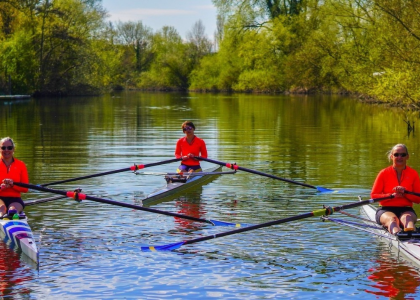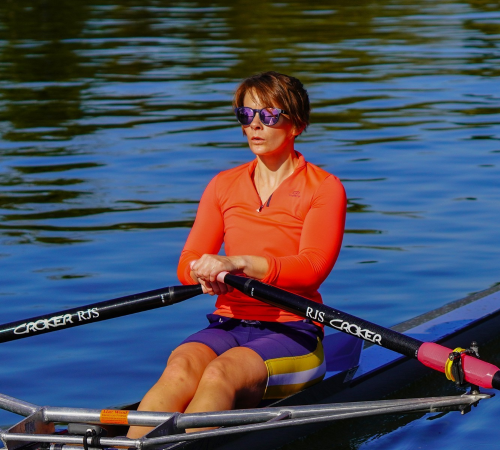I moved to Portsmouth for a one-year post-doctoral position and was training for a marathon at the time. I picked up an injury in my foot so was looking for a lower impact way to keep my fitness up while I recovered and started rowing at Southsea Rowing Club. I was hooked pretty instantly (despite it being January and wet and miserable) and it pretty much took over my life from there!
I’ve always been interested in pushing myself and seeing what I’m capable of. Preparing for this challenge has been a two-year project and the commitment the row requires really appealed to me. You’re essentially giving everything to training and prep to ultimately end up in a situation where you have a massive uncontrollable – the weather. This means it’s a huge mental as well as a physical challenge and really the ultimate venue to see what you can do.
We’ve undertaken rigorous training courses in first aid, sea survival, and navigation and seamanship. We’re also putting in hundreds of hours of training on our boat in offshore waters. We have first-rate safety equipment on the boat and will be clipped on at all times. We’ll carry communication equipment to ensure we can be in contact with the race organisers and maritime safety organisations as needed. That said, we are undertaking an unsupported crossing, which means we have to carry everything we need with us for the duration of the journey (somewhere between 40 and 60+ days). At times, the nearest people to us will be on the International Space Station and help could be as much as several days away. This kind of challenge is both tough and inherently dangerous – there’s a reason more people climb Everest every year than have ever rowed an ocean - but we’re doing everything we can to ensure we’re being as safe as possible.
My mum didn’t speak to me for about a week when I signed up, but she’s come around now! My friends and family have been incredibly supportive, and I don’t think they were at all surprised that I took this on. While it’s an unsupported challenge and it will only be the crew of three on the boat, it’s a huge undertaking and supported by so many others behind the scenes and we’re hugely grateful for all that (often invisible) support.
There are so many things to be excited about, like epic night skies and beautiful sunrises and wildlife spotting, but I think the thing I’m most looking forward to is the simplicity of life on board. The daily rowing routine strips the complexity of life back to the very simple eat, sleep, row, and repeat for 40+ days which has its own weird kind of appeal!
The food. Dehydrated meals are ok but not a patch on fresh food!
I think the biggest obstacle for the row – and probably with any challenge – is that internal voice that tells you that you can’t do it, you’re not strong enough, or fast enough or prepared enough. Ocean rowing is known to be as much a mental challenge as a physical one and there’s nowhere to hide on an 8-metre rowing boat so mental resilience is essential.
As a crew we’ve talked a lot about our goals, so we know we’re on the same page and what success looks like for us. We’re also spending time going over crisis operations, talking about everything that could go wrong and troubleshooting how we would respond. On an individual level, I’ve been looking at every setback and challenge - from injury to having our boat broken into recently - as an opportunity to build resilience. I also spend a lot of time doing boring slog training, like spending long hours on the rowing machine which really helps with the mental game.
We started training when we signed up for the row in February 2021. We’re all rowers so had a good cardio background but have been building strength, getting to know our boat, completing compulsory safety courses, and doing the 101 other things that go into an ocean rowing campaign. As we get closer to the start line, we’re stepping up the training, spending more and more time in the boat or on the rowing machine, and banking a lot of hours in the gym, or going over crisis operations training together.
There’s a lot to fit in but I’ve been training for one project or another for the best part of ten years, so it all sort of seems to juggle itself at this point! It helps that a large part of my social life revolves around rowing, and that I enjoy training, so that makes it easier. I also get up really early!
I’d always found motivation really easy in the past – I mostly love training, so it just never occurred to me not to get up and go to the gym! More recently I’ve had a lot of setbacks. I had to have surgery on my wrist and then later fractured my ankle. With the row coming up, it wasn’t really an option to just sit and wait for my ankle to heal, so even when I still had an orthopaedic boot on, I was dragging myself to the gym to do the things I could still do. That felt really hard as I couldn’t do the kind of training I enjoyed. For me, what gave me the motivation then was my crew and knowing the commitment I had made to them, but also trying to focus on the things I could learn and improve while others had to be paused, like working on my upper body strength.
I think when it comes to digging deep, I almost do the opposite of this – switch everything off and just focus on the next ten seconds, and once you’re through that, focus on the next ten. I count strokes when I’m tired on the river, although that might be more of a challenge for 3,000 miles! If you stop telling yourself you can’t do something, it’s easier to find another gear and work a bit harder.
We’ve known each other for about eight years, and all met through Eton Excelsior Rowing Club. We’ve spent a lot of years training together, so each know what the others are capable of and have seen each other at our best and worst!
We wanted to support charities where we could see the impact in the local community, and we have strong personal connections to the work of both Thames Hospice and DASH. One of the goals of our row is to inspire women and girls, and while our charities might not seem obviously connected to that goal, we know that women are both more likely to have caring responsibilities and more likely to be victims of domestic abuse. We all recognise the exceptional care that hospices provide and the service they give to terminally ill individuals, those with life-limiting conditions, and their families and carers. DASH provides specialist support to adults and children experiencing the complex needs associated with domestic abuse, advocating on behalf of victims and ensuring their voices are heard.
I’ve got a lot of other projects that I’d like to do that pop into my head and then get labelled ‘things for after the row’ so I’m excited to have the time to work through those!
Get out of your own way. I think I’ve probably wasted a lot of time in my life saying ‘I’d love to do that but..’ and finding reasons why I couldn’t give something a go. Trying new things or pushing yourself is like a muscle that can be trained like any other. The more you push yourself the easier it gets.
I started climbing about a year ago and wish I’d found that earlier. I’m also a very rubbish freediver so would like to have more time to work on that. If I could click my fingers and magically be good at any sport, I think it would be gymnastics – gymnasts are crazy strong.
I love watching rowing as I’m a technique nerd but also spend a lot of time watching bouldering videos and love taking part in both. I also love watching winter sports, especially things like Ski Cross.
This is huge for me. I was really sporty as a child but when I went to high school I stopped playing sport as I didn’t really feel like it was a space for me and didn’t pick it up again until much later. There were so many things I just didn’t know I could do, and I know now that seeing women in endurance sport, for example, helps female athletes keep going in what is still a difficult space. At the same time, I think sports like rowing can seem really elitist and like they’re only for the very few, so anything that can help challenge that and support young people is so important.
A lot of my hobbies probably don’t seem very relaxing! I really enjoy bouldering and freediving and they help me to switch off as I’m focused on something else. I’m not very good at sitting still and much prefer outdoors to indoors, so I do a lot of hiking too. And then I do a lot of cooking and baking to fuel all of that!
The impact of this challenge on my mental health has been really significant. I’ve always been really hard on myself and while setting high standards has helped me to push on that mindset has been pretty negative when competing as I always feel like I could have done more or been faster. Both being injured this year and knowing that I need to shift this mindset for the row has really helped me to do the work that I needed to approach things differently and to push myself in a more positive way.
When I look back, ten-year-old me was this glorious independent little weirdo and was probably doing just fine. Our boat for the Atlantic crossing is called Dolly Parton. She once said ‘find out who you are and then do it on purpose’ and that seems like excellent advice to me.
City or village? - Village
Sweet or savoury? - Sweet
Summer or winter? - Both Movies or music? - Music
What superpower would you most like? - Definitely teleportation
The Elite Sponsorship Fund
Our Elite Sponsorship Fund helps support CSSC members who are representing their Nation with the associated costs of competing in sporting or athletic events, tournaments or competitions. Funding can assist towards equipment, kit, travel expenses and training fees. However, that’s not all it can do.
Some CSSC members, while not competing for their Nation, are attempting some incredible sporting challenges or adventures. Be that something amazing like swimming the channel or rowing the Atlantic like Rachel!
If you’d like to find out more about CSSC’s unique and exclusive Elite Sponsorship Fund, why not get inspired and read some of our amazing stories and apply today. Or, if the Elite fund is not quite right, explore some of our other amazing funding opportunities.
Find out more about the Elite Sponsorship Fund.






